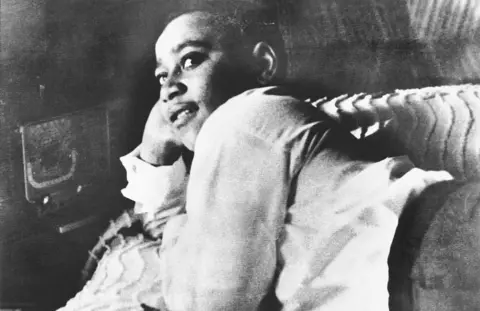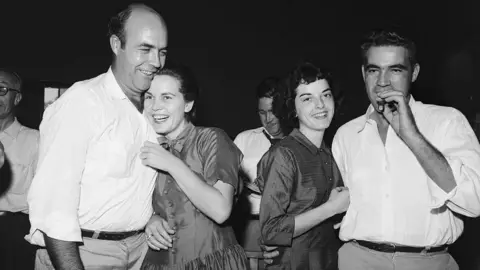 Getty Images
Getty ImagesThousands of pages of records have been released in the US detailing the government’s response to the lynching of black teenager Emmett Till in 1955.
The US National Archives said the records it released ahead of the 70th anniversary of the African-American youth’s killing were “watershed moment in American history”.
Emmett Till, a 14-year-old from Chicago, was visiting family in Mississippi when he was brutally beaten and killed after a white woman claimed he harassed her at a store.
Till’s lynching and the subsequent activism of his mother Mamie Till-Mobley helped galvanise the civil rights movement in the US.
It was only in 2022 that the US signed the Emmett Till Anti-Lynching Act into law, which makes lynching a federal hate crime offence.
More than 6,500 pages of records have been released to the public – ranging from previously undisclosed case files to public materials such as magazine and newspaper clippings.
The files, created by the Civil Rights Cold Case Records Review Board, are an initial release of federal records related to the case, the National Archives said.
“The release of these records is nothing short of historic,” said board co-chair Margaret Burnham.
“Emmett’s family members, as well as historians and the public at large, have deserved a complete picture of the federal government’s response,” Ms Burnham said.
“The story of Emmett Till and the injustices done to him is still being written, but these documents offer up some long-overdue clarity.”
The death of the teenager is thought to have led to the 1957 Civil Rights Act.
Who was Emmett Till?
On 24 August 1955, Emmett Till was visiting family and entered a store in Money, Mississippi, where Carolyn Bryant, then 21, worked.
Bryant accused him of making improper advances and harassing her while she was alone in the shop.
On 28 August, her husband and brother-in-law kidnapped the boy at gunpoint, tortured him and threw his battered body into a river.
At Till’s funeral, his mother insisted on an open coffin so everyone could see what had been done to him. Published photos of his brutalised remains shocked the nation.
The two kidnappers – Roy Bryant and JW Milam – were arrested over the murder, but were quickly acquitted by an all-white jury.
They later admitted to the killing in a magazine interview, but could not be re-tried under US law. Both men and Carolyn Bryant are now dead.
 Getty Images
Getty ImagesDuring the trial against her husband and his half-brother, Carolyn Bryant took the stand and testified that Till had grabbed her hand and propositioned her.
But in a 2008 interview with a US historian, she recanted the statement, reportedly saying: “That part’s not true.”
Till’s death led to rallies across the country, which became a major part of a civil movement that led to African American voting rights.

